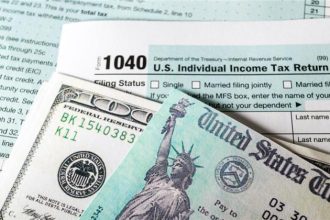Credit Sesame examines how falling consumer confidence is shaping financial decisions.
Consumers are much less confident than they were a couple of months ago. How they act on their growing fears could determine the economy’s direction.
Every month, the University of Michigan publishes an Index of Consumer Sentiment. As the name suggests, this measures how consumers feel about the economy and its impact on their finances. Economists and investors closely watch this index to see whether consumers are confident, fearful, or somewhere in between.
The latest reading of the Index of Consumer Sentiment shows a sharp drop in confidence in February. When that happens, one concern is that losing confidence could hurt the economy, as nervous consumers spend less.
While that’s a valid concern, to some extent, the recent loss of confidence could be a healthy reality check for consumers. This may mean more consumers realize they must change their borrowing and spending habits.
Why consumer confidence is falling fast
The Index of Consumer Sentiment fell by 9.76% in February, following a 3.11% decline in January. Overall, the index is down by 15.86% from a year earlier.
So, what’s giving consumers the chills?
For one thing, concern about inflation has come back with a vengeance. The University of Michigan survey shows consumers expect prices to rise by 4.3% over the next year. That’s a full percent from January 2025 and a 1.7% higher inflation rate than the 2.6% consumers expected last November 2024.
To a large extent, this can be attributed to the anticipated impact of new tariffs. What’s harder to measure is the heightened uncertainty about government policies. The full extent of tariffs, layoffs, and budget cuts has yet to be made clear, and it will take some time for the impact to set in.
Will these sudden changes cause inflation? A recession? Or will it all turn out to be for the best?
Nobody knows yet. The problem is that uncertainty paralyzes decision-making. Whether it’s consumers considering a major purchase or businesses deciding whether to hire and invest, uncertainty often forces people to the sidelines as they wait and see how the game is being played.
How inflation and uncertainty are shaping consumer decisions
Given the nature of tariffs, concern about inflation is understandable. With significant policy changes being implemented at dizzying speed, uncertainty is also natural.
In this daunting environment, consumers would do well to focus on what they can control.
The latest Survey of Consumer Expectations from the Federal Reserve Bank of New York found that as of January 2025, consumers expected their spending over the next year to grow faster than their incomes and the inflation rate.
Perhaps the plunge in consumer confidence in February 2025 will put a damper on those spending plans. That might not be such a bad thing.
Over the past four years, consumer debt has risen by 23.9%, with credit card debt leading the way. By increasing spending faster than their incomes are growing and faster than necessary to keep up with inflation, many consumers have been living beyond their means.
Perhaps a little less consumer confidence will cause some to revisit their spending habits. In the short term, this could mean an economic slowdown – and possibly even a recession. However, if it leads to more responsible borrowing habits, it could put the economy on a more solid foundation in the long run.
4 financial steps to stay secure
As the consumer confidence survey suggests, economic uncertainty is on the rise. With inflation concerns and a potential slowdown ahead, focusing on what you can control may help you stay financially stable, regardless of where the economy heads next.
- Reassess your spending habits. Ensuring that expenses don’t exceed take-home pay can provide more financial flexibility. Finding ways to cut back on nonessential spending may also make it easier to build savings over time.
- Lower borrowing costs. Carrying a credit card balance can become costly, especially with high interest rates. When possible, paying off balances in full each month may help avoid added interest. Refinancing through a personal loan or a balance transfer credit card could offer a more affordable repayment option for those with high-interest debt.
- Strengthen job security. Government layoffs and economic shifts can make the job market more competitive. Keeping skills up to date, maintaining strong job performance, and considering how an employer’s business model may hold up in this environment could be beneficial. Those in industries heavily reliant on government contracts may want to assess potential risks.
- Optimize your credit score. A strong credit score can help maintain access to credit and secure better interest rates. With lending standards tightening and inflation keeping rates high, improving credit health may provide financial advantages in the long run.
Rather than letting economic uncertainty create stress, it may be helpful to use it as motivation to strengthen financial habits. Adjusting spending, managing debt, and maintaining financial stability could help turn falling consumer confidence into an opportunity for long-term security.
If you enjoyed How falling consumer confidence affects personal finance and spending you may like,
Disclaimer: The article and information provided here are for informational purposes only and are not intended as a substitute for professional advice
Read the full article here
















